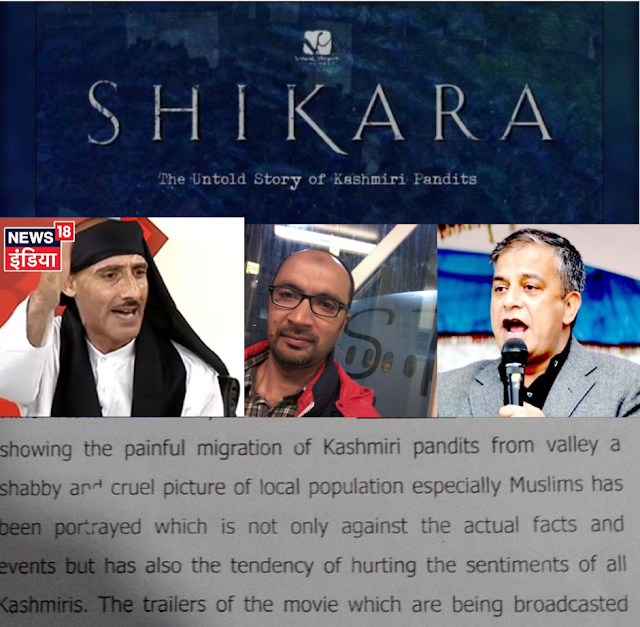Omertà in Kashmir: A Call for Breaking the Silence (Sualeh Keen, 2016)
 |
| Mohammad Sultan Bhat, a sarpanch (village head), who was shot dead by terrorists outside his home in Shopian in 2014. |
"Omertà is a code of honor that places importance on silence, non-cooperation with authorities, and non-interference in the illegal actions of others."
It
is a myth that Jihadis did not target the Muslim Kashmiris. If we were to go by
(conservative) official statistics, some 13,000 Muslim Kashmiris (not including Kashmiri policemen) were gunned down by the Jihadis.We need to understand that in terms of murders, kidnappings, rapes, loot, and humiliation at the hands of militants, the Muslim Kashmiris who stayed back suffered most, because they had to endure it for 26 years. And still do. No human rights activist talks of them. News like this goes unnoticed.
Muslim Kashmiris suffered the direct brunt of militancy for
decades and are far more in number (this should be fairly obvious). Many Muslim
Kashmiris also had to flee to Jammu/Delhi due to:
- Political affiliations or just for being related to some politician
- Their name in a 'hit list' posted on the door of a nearby mosque
- Militant extortionists who would kidnap and demand ransom
- Fear of forced conscription into the militant ranks
- Threat to their daughters of forced marriage with militants
- Many other reasons.
These
Muslim Kashmiris were not party to Pakistan's proxy drama and their troubles
were not 'self-inflicted' (as some like to believe). There were also many many
of those Muslim Kashmiris who did not flee, yet never supported the tehreek.
Indeed, they did not raise a voice against separatists, but then they were and
are scared. The families of the victims are silent about such internecine
atrocities, what with the jihadis and their overground supporters still being
active.
Paani
mein rehkar magarmachh se baer? Who would be that stupid. The situation in
Kashmir can best be described as an Omerta.
By
remaining silent about their personal brushes with terror, the Muslim victims
of militancy do a disservice to their own selves and to their 'co-victims' from
their own community. No wonder then that nobody is demanding justice for the
Muslim victims of militancy.
SILENCE
OF MUSLIMS AFFECTS MINORITIES DIRECTLY
The
silence of Muslims has an even worse effect on the non-Muslim victims of
militancy: nobody believes the account of minorities.
Take
the Pandit minority; it has been left isolated and abandoned, without any
supportive voices from the Muslim majority. The Pandits have to vociferously
defend their narrative and are met with skepticism, conspiracy theories,
outright denial, ridicule, and skeptical cross-examination:
1) "Why were *Pandits alone* targeted?"
Not true. See above.
2) "Why were *Pandits who stayed back* not targeted?"
Not true. Look up 1997 Sangrampora, 1998 Wandhama, 2003 Nadimarg massacres.
3) "Why *no other community*, such as the Sikh Kashmiris, was harmed?"
Not true. Look up 2000 Chattisinghpora, 2001 Mehjoor Nagar massacres.
And
so on... all because not many Muslims have the guts to corroborate the accounts
of terror from circa 1990.
It
is because of this silence of Muslim victims that the vocal Pandits stand out
as a lone beleaguered group of victims demanding for justice, when Pandits are
but a small sub-set of victims who managed to save themselves early. But then,
the Pandits have the luxury of being outside the firing range of the still active
militants and their overground supporters.
When
these Muslims muster up some courage and start talking openly against militancy
and about the atmosphere of terror in 1989-90 will be the day that Pandits will
get real truth and reconciliation. In fact, it is more desirable if Muslims
were to demand justice for Pandits.
WHAT
IS TO BE DONE
Apart
from highlighting the atrocities on the Pandits, it is perhaps more important
to empower the dissident voices among the Muslim Kashmiris. Obviously, the
Omerta imposed by the militants and their overground supporters can be broken
only if some pioneers speak out, which will encourage other victims to come out
from their closets and break their collective silence.
[PHOTO:
Mohammad Sultan Bhat, a sarpanch (village head), who was shot dead by militants
outside his home in Nazneenpora in Shopian in 2014.]
. . .
Postscript by Sualeh Keen:
I would like to remind everyone that in the mid 1980's, the Khalistanis too targeted 'their' community, and not just Hindus in Punjab. Larger numbers of Sikhs were killed by them than Hindus. Yet, in our overgeneralized worldview, a Sikh means a Khalistani, and a Muslim Kashmiri means a Jihadi separatist, without realizing that the militants kill more people from their own communities. Internationally too, that is how we view Syrian people: as if they are all ISIS soldiers, and do not include their numerous Muslim victims.
We have such huge blind spots in our perception of events and
violent movements. We consider the perpetrators and their victims from the same
community as a single unit. It has to be that our own perceptions are communally polarized.
We are communal. We need to introspect. That's why, among the 13000+ Muslim Kashmiris brutally murdered
by the Kashmiri militants, I chose the photo of this victim for this post; it
might help shatter our stereotypes about Muslim Kashmiris.
Please don't mistake the map for the territory!
. . .
Original post by Sualeh Keen (28 September 2016): https://www.facebook.com/groups/mvjkl/permalink/1398918466803248/


Comments
Post a Comment